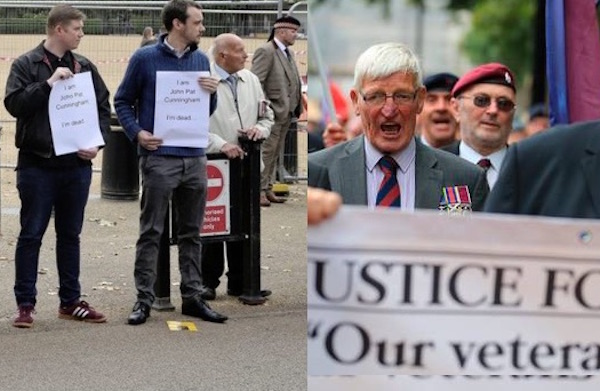
A demonstration in support of killer British troops was dramatically opposed by relatives and supporters of their Irish victims.
Former British soldiers marched in London last weekend in support of a fellow soldier accused of shooting dead County Armagh man John Pat Cunningham, a 27-year-old with learning difficulties. He was killed in Benburb, a village on the Irish border between counties Armagh and Tyrone.
Mr Cunningham was unarmed and shot in the back while running away from soldiers in 1974. A court has heard that the victim was running away from the British Army patrol because he had a fear of men in uniform.
His alleged killer is only now facing prosecution. Dennis Hutchings was the most senior soldier in the patrol which opened fire on Mr Cunningham as he ran across a field.
Five rounds were fired and Mr Cunningham was struck at least twice. Three shots are believed to have been fired from Hutchings’ own rifle.
As the group of ex-soldiers marched past parliament, Hutchings threw his military medals at the building in protest.
But his protest was met with a counter demonstration by campaigners holding a silent vigil and carrying placards which read “I am John Pat Cunningham”.
Some right-wing newspapers (The Daily Mail and The Sun) have recently published misleading and inaccurate information claiming that there is a ‘witch-hunt’. But only four British soldiers have ever been convicted of murder in the north of Ireland. One murder conviction was overturned on appeal. All four were freed after just five years of their life sentences through the use of the “Royal Prerogative of Mercy”. All were allowed to re-join the British army.
Paul O’Connor, from the Pat Finucane Centre, which works with the Cunningham family, was among those counter-protesting in London last weekend, as other counter-protests took place at locations including Belfast, Derry, Strabane and County Armagh.
He said: “I know that the British Army has had a culture of impunity over the years and they believe that they are not subject to the rule of law like anyone else, but they are - or they should be.”
![[Irish Republican News]](https://republican-news.org/graphics/title_gifs/rn.gif)
![[Irish Republican News]](https://republican-news.org/graphics/title_gifs/harp.gif)

